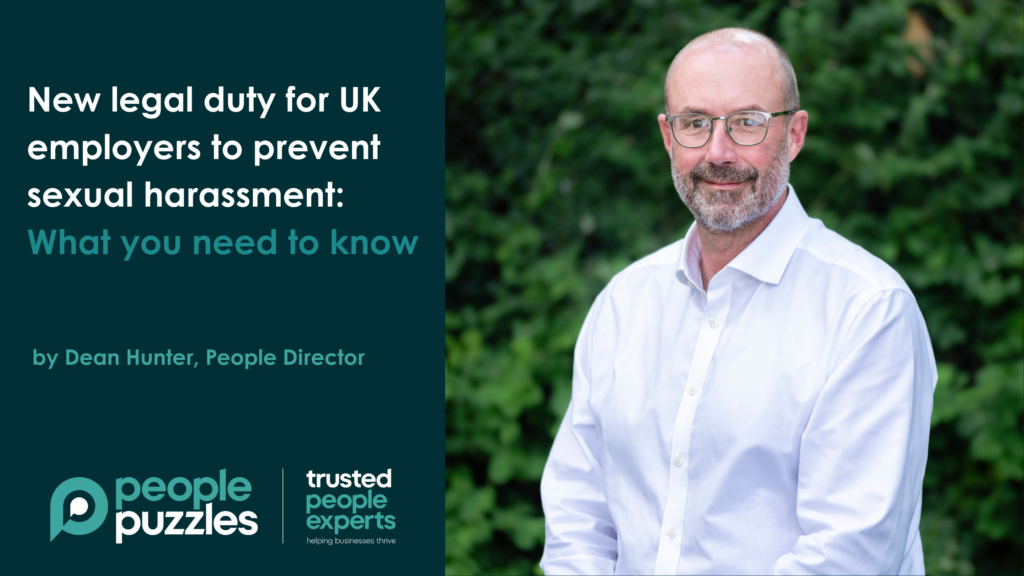From 26th October 2024, a new law requires all UK employers to take “reasonable steps” to prevent sexual harassment in the workplace. To help you mitigate risk and ensure your business is compliant, we have collated some practical advice from our expert People Director team.
This law affects all workplaces, including SMEs, and failing to comply doesn’t just increase financial risk (through higher compensation awards); it also risks reputational damage. Think of the high-profile cases that have made the news – no business wants to be seen as tolerating inappropriate workplace behaviour.
While sexual harassment is already illegal, this new requirement put the onus on the employer to ensure prevention. As a leader, it’s your responsibility to set the tone, embody the values you want to see in your workplace and make it clear that sexual harassment will not be tolerated.
So what do you need to know and what steps you should take to ensure compliance and foster a safer, more respectful work environment?
Let’s start with some background.
Why this change is happening
The #metoo movement raised awareness of the widespread nature of sexual harassment of women. Since then, there have been many high-profile cases, with the Harrods case dominating headlines in recent weeks. The Equalities and Human Rights Commission (EHRC) and the Women and Equalities Commission (WEC) both conducted significant research, revealing that more needs to be done to protect workers of all genders from sexual harassment. Their findings have shaped the new legal framework designed to ensure that employers aren’t just reactive but take proactive measures to prevent harassment before it happens.
This change is part of the Working Protection Act that was passed in 2023 and will transform how employers’ approach sexual harassment in the workplace. This law impacts everyone—men and women—and applies to harassment from anyone, regardless of gender.
What exactly is sexual harassment?
Sexual harassment can be anything from unwanted sexual advances to inappropriate jokes or gestures. The legal definition involves:
- ‘Unwanted conduct’ of a sexual nature; and
- Conduct that either violates a person’s dignity or creates an intimidating, hostile, degrading, or offensive environment.
It’s important to note that even if the person didn’t intend to offend, it still counts as harassment if the result is discomfort or distress. It is your responsibility to ensure that your people know how to ensure that banter does not cross the boundary into areas that could result in a tribunal.
People Director Dean Hunter says, “Having dealt with complex sexual harassment cases in the past, it is clear that the line between “banter” and sexual harassment is one that many organisations and individuals find difficult to define. This is where the need to provide effective training and prompt intervention become paramount. “
He continues, “Training should seek to prevent the line being crossed, the intervention must ensure that the employee affected receives support and the sexual harassment stops immediately.
To be effective, leaders need to make a clear statement of zero tolerance toward harassment in any form and their actions need to back up that these are not just hollow words.
A culture where sexual harassment is tolerated is toxic, and the consequences will impact the business, including high levels of employee turnover, reputational damage (reducing the ability to attract the talent you need), alongside financial loss through litigation.
A toxic culture is an unhealthy business.”
What’s changing for employers?
From October 26th, 2024, it won’t be enough to just respond to incidents of sexual harassment. You’ll now be legally obligated to take steps to prevent it from happening in the first place. This means demonstrating that you’ve taken ‘reasonable steps’ to prevent sexual harassment, such as implementing training to fostering open communication about workplace behaviour. If a tribunal finds that you didn’t take these steps, you will have to compensate the victim of sexual harassment; and that compensation is likely to be increased by up to 25% once this becomes law.
Practical steps you can take to prevent sexual harassment
Employment Lawyers Mishcon de Reya advises businesses to take the following steps:
- Develop a clear policy – This can be part of your wider anti-harassment policy, but it must clearly outline what sexual harassment looks like, how to report it, and what the consequences are for those found responsible.
- Engage your staff – Regular staff engagement is crucial. Make it clear that the door is always open for staff to raise concerns. This could include one-on-one meetings and surveys to check how comfortable people feel at work and whether they know how to report harassment. Wotter, who provide People Puzzles with a staff pulse survey will be including questions that enable data on this issue to be captured and measured, whilst maintaining anonymity.
- Identify risks – Where are the power imbalances in your organization? Are there any roles that could make certain staff more vulnerable? For instance, lone working, customer-facing duties, or events where alcohol is present may increase the risk of harassment. Consider what steps you can take to mitigate those risks. For instance, in a hospitality business where your people will be in contact with customers who are drinking, you may need to put up notices reminding your clients that you will not tolerate any sexual harassment towards your staff.
- Create a reporting system – Make it as easy and confidential as possible for your staff to report harassment. Some employees may feel more comfortable doing this anonymously, so consider options like an online portal.
- Provide training – Training is key. All employees, especially managers, need to be trained on how to identify sexual harassment and how to respond if it happens. Third-party harassment, such as from clients or suppliers, is also something to be aware of and prepare for. Senior managers must lead by example by attending training themselves to highlight the importance of this issue and ensure that adhering to the rules is part of the culture.
- Act quickly when complaints are made – If a complaint is raised, act immediately rather than leaving issues to surface during an exit interview. You will also need to assess whether extra steps need to be taken to safeguard the employees involved. This includes respecting the confidentiality of all parties. You might need to move the accused to a different team or offer additional support.
- Third-party harassment – If staff regularly interact with external clients, make sure you address third-party harassment with as much seriousness as internal incidents. For example, staff should be empowered to end calls or interactions if harassment occurs, regardless of the seniority of the person they are dealing with.
- Monitor and evaluate – Regularly review harassment reports and analyse any patterns. Make adjustments to your policies and procedures as your business grows and keep the conversation going with your staff to ensure they feel safe and supported.
“A common theme from the high profile reported cases is that there were significant barriers to ‘speaking up’ and a belief that the organisation would not listen or act upon concerns,” says Dean.
“Understanding these barriers and providing a framework to be listened to with prompt action following a concern being raised is key to protecting your employees and the business.
As highly experienced People Directors, we can help you take the proactive action needed and do the right thing.”
Being a responsible employer
While this new duty may seem like an extra burden, it’s also an opportunity to improve your company’s culture and show that you’re committed to creating a safe and respectful environment for everyone. By investing time and effort into preventing harassment, you’ll build a stronger, more resilient workforce that knows that you care.
Whatever size of organisation you are leading, it’s important to take steps now to make sure you’re compliant, before the October 26th deadline—and know that by doing so, you’re not just avoiding legal risk, you’re building a better workplace for everyone.



